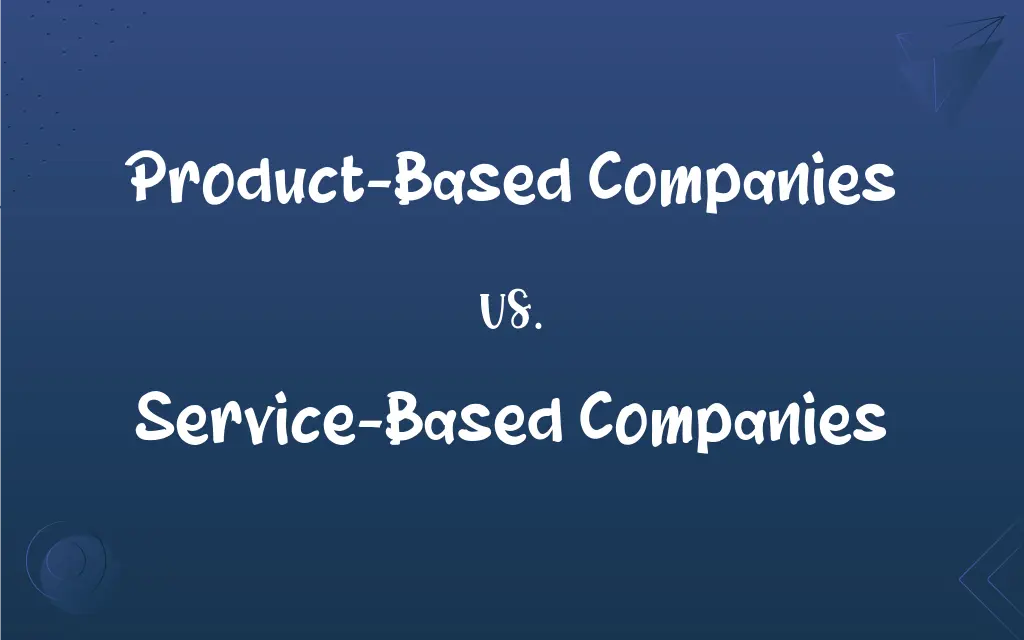Product-Based Companies vs. Service-Based Companies: What's the Difference?
Edited by Aimie Carlson || By Janet White || Published on February 8, 2024
Product-Based Companies refers to businesses focusing on creating and selling tangible goods. Service-Based Companies refers to enterprises offering intangible services to consumers or businesses.

Key Differences
Product-based companies primarily focus on designing, manufacturing, and selling physical products to consumers or other businesses. In contrast, service-based companies offer intangible services, ranging from consulting to repair work, that do not result in ownership of a physical product.
The revenue model of product-based companies typically involves one-time sales or recurring sales of goods. Service-based companies, however, often rely on recurring revenue streams from ongoing services or time-based billing.
Product-based companies invest heavily in research and development to innovate new products or improve existing ones. Service-based companies, on the other hand, emphasize skill development and expertise to enhance the quality of their services.
In product-based companies, customer satisfaction often hinges on the quality and functionality of the products. For service-based companies, customer satisfaction is more dependent on the quality of service delivery and customer experience.
Marketing strategies in product-based companies frequently revolve around the features and benefits of their products. In contrast, service-based companies market the expertise, reliability, and personalized nature of their services.
ADVERTISEMENT
Comparison Chart
Primary Offering
Physical products (e.g., electronics, apparel)
Intangible services (e.g., consulting, maintenance)
Revenue Model
Sales of goods, often one-time
Recurring services, time-based fees
Focus in Development
Product innovation and manufacturing
Skill and expertise enhancement
Customer Satisfaction Basis
Product quality and functionality
Quality and efficiency of service delivery
Marketing Focus
Product features and benefits
Expertise, reliability, and personalization
ADVERTISEMENT
Product-Based Companies and Service-Based Companies Definitions
Product-Based Companies
Enterprises where the primary value lies in the physical items they offer.
Nike, a product-based company, is renowned for its athletic footwear and apparel.
Service-Based Companies
Firms specializing in non-physical, often personalized, services.
Marriott International, offering hospitality services, is a service-based company.
Product-Based Companies
Organizations whose revenue comes primarily from selling physical goods.
LEGO, as a product-based company, thrives on the sale of its toy building blocks.
Service-Based Companies
A company primarily offering intangible services to clients.
Accenture, providing consulting services, is a prominent service-based company.
Product-Based Companies
A company that manufactures and sells physical goods.
Apple, known for its iPhones and MacBooks, is a leading product-based company.
Service-Based Companies
Businesses where the main value proposition is expertise and service delivery.
KPMG, known for its auditing services, is an example of a service-based company.
Product-Based Companies
Businesses focusing on the creation and distribution of tangible products.
Toyota, with its extensive range of automobiles, exemplifies a product-based company.
Service-Based Companies
Organizations whose revenue is derived from providing ongoing or one-time services.
Uber, providing transportation services, operates as a service-based company.
Product-Based Companies
Firms that invest in research and development for tangible product innovation.
Samsung, a product-based company, continuously innovates in the electronics sector.
Service-Based Companies
Enterprises focusing on delivering expertise, advice, or maintenance.
Deloitte, offering professional services, is a key player among service-based companies.
FAQs
What defines a product-based company?
It's a company that creates and sells physical goods.
Can a company be both product and service-based?
Yes, some companies offer both products and services.
How do product-based companies generate revenue?
Through the sale of physical products, either one-time or recurring.
What is crucial for the success of service-based companies?
Providing high-quality, efficient, and personalized services.
What is a key challenge for product-based companies?
Continuously innovating and improving their physical products.
How important is customer service to service-based companies?
Extremely important, as it directly impacts customer satisfaction.
Can service-based companies operate remotely?
Many can, especially those providing digital or consulting services.
What is a service-based company?
A business primarily offering intangible services to its customers.
What is the revenue model of a service-based company?
They earn through providing services, often with recurring or time-based fees.
Do product-based companies need a strong supply chain?
Yes, an efficient supply chain is crucial for their operation.
Is branding important for product-based companies?
Yes, strong branding can significantly impact product sales.
How do service-based companies build client relationships?
Through consistent, high-quality service delivery and customer engagement.
Can a product-based company shift to a service-based model?
Yes, this can happen, especially with the addition of value-added services.
How do marketing strategies differ between these two types of companies?
Product-based companies focus on product features; service-based companies on service quality and expertise.
Are e-commerce companies considered product-based?
Yes, if they primarily sell physical goods, they are product-based.
Do service-based companies require physical inventory?
Generally, no, as their value lies in intangible services.
Are financial services firms considered service-based companies?
Yes, as they primarily offer financial services.
How do product-based companies manage returns and warranties?
They often have policies and processes for handling returns and warranties.
Do service-based companies require a physical office?
Not always, depending on the nature of their services.
What role does technology play in product-based companies?
Technology is key for product innovation and manufacturing processes.
About Author
Written by
Janet WhiteJanet White has been an esteemed writer and blogger for Difference Wiki. Holding a Master's degree in Science and Medical Journalism from the prestigious Boston University, she has consistently demonstrated her expertise and passion for her field. When she's not immersed in her work, Janet relishes her time exercising, delving into a good book, and cherishing moments with friends and family.
Edited by
Aimie CarlsonAimie Carlson, holding a master's degree in English literature, is a fervent English language enthusiast. She lends her writing talents to Difference Wiki, a prominent website that specializes in comparisons, offering readers insightful analyses that both captivate and inform.







































































